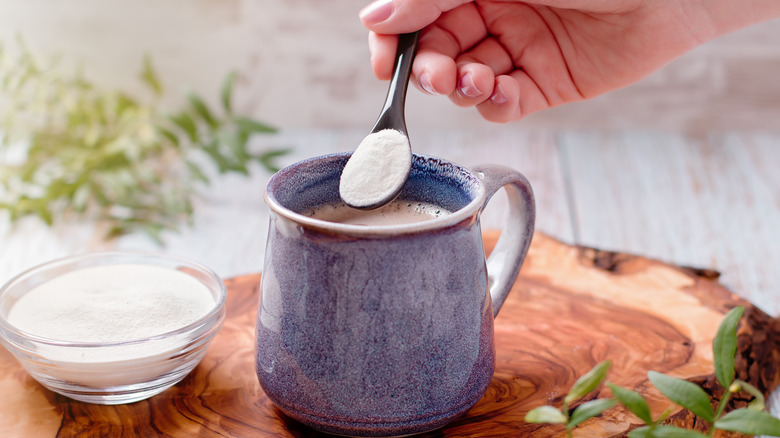These Common Mistakes May Be Hurting Your Collagen Routine
With age, it's natural for many to develop fine lines, wrinkles, and saggy skin. Collagen in skincare is the latest buzzy ingredient to try and fight aging, but what is collagen, and what is its impact on aging skin?
"Skincare formulated with collagen plumps, hydrates, and conditions the skin," Aesthetician Melanie Grant told Byrdie. Our body produces less collagen as we age, and our skin loses its firmness. After age 25, your body's collagen production slows down.
As collagen production declines in your body, you can also get it from your diet by eating collagen-rich foods like fish and chicken, and taking supplements, according to Healthline. Many of you might already be taking collagen supplements, as they're available online and at stores like Whole Foods, Walgreens, and Target. While you may think you're all good on collagen because you take supplements, it's important to take it correctly to get all the benefits; otherwise you're wasting your time and money.
How to take collagen correctly, so it actually works
Collagen supplements are all the rage right now. When Jennifer Aniston shared she takes collagen supplements in her morning coffee (via Vital Proteins, where she is Chief Creative Officer), everyone jumped on the bandwagon. However, to get collagen to work for your body, you need to keep a few things in mind.
For one, the temperature you take your collagen supplement at is crucial for it to be effective. Assistant professor of microbiology at Texas A&M University, Brooke Russell, pointed out that drinking it hot might not be helpful because "collagen powder falls apart at temperatures above body temperature," (via Well+Good). Basically, you are just consuming gelatin with zero collagen benefits. For it to work, Brigitte Zeitlin, RD, shared with the outlet that you can mix it with iced lattes or water.
Another thing to remember is to take it with vitamin C. Board-certified dermatologist, Keira Barr, told Mindbodygreen, "Vitamin C is a key cofactor in the synthesis of collagen and elastin, [which help] give your skin that plump and youthful appearance." If you are vitamin C-deficient, the supplements won't do their job, so choose a collagen supplement with vitamin C or take the two together. You can take all the collagen supplements in the world, but if you don't protect yourself from the sun, the supplements won't help much. The sun's ultraviolet rays causes the skin to thin, by breaking down collagen fibers, according to Shape. Always wear sunscreen!

